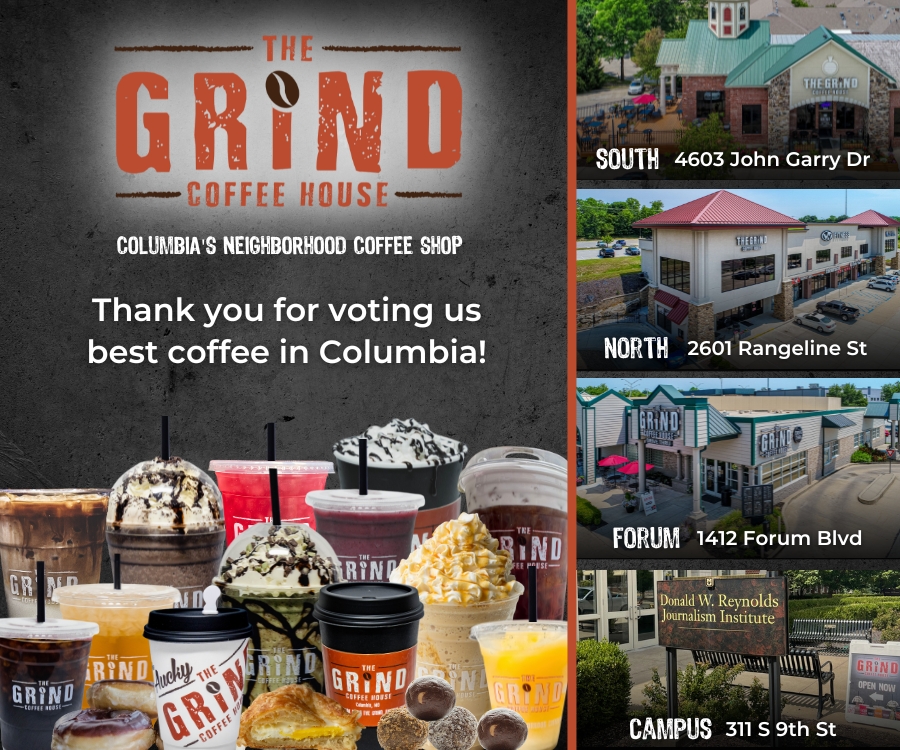Photos by L.G. Patterson
Columbia is a haven for sports play and entertainment; from youth athletics to club teams, from amateur sports to intercollegiate athletics play, it’s undeniable that Columbia athletics is a boon to city and state revenue. A large factor in this is the three universities with intercollegiate athletics bringing in visitors from other cities and towns inside, as well as outside of Missouri.
With Columbia’s quickly growing population and demand for different spaces needed for current and up and-coming sports, however, losing sporting events at the amateur and collegiate levels is becoming more prevalent, leading to loss of tourism and spending.
Inside Columbia Publisher Fred Parry hosted a CEO Roundtable luncheon with eight local leaders, who all directly impact and are impacted by the state of athletics in Columbia, to discuss the current situation and future of athletics in the city. The Broadway Hotel sponsored the event with the hotel’s award-winning Chef Jeff Guinn catering the meal that accompanied the conversation.

Director of Parks and Recreation
City of Columbia

Interim Director
Show Me State Games
Standing Out in Missouri
The vast appeal of a university town still means vying for events held in the city. According to the Missouri Census Data Center website, Columbia is the fourth most populated city in Missouri behind Kansas City, St. Louis and Springfield, respectively.
Though Columbia has the four-year, publicly funded University of Missouri flagship campus and the prestige that comes with it, Springfield has Missouri State University, the second-largest four-year, publicly funded university. It serves as a closer-to-home option for many students in southern Missouri and costs less in tuition for in-state and out-of-state students compared to Mizzou.
Amy Schneider, director of the city of Columbia Convention and Visitors Bureau, says, “What I like to remind everybody about is that from our perspective, everything that we bring in, we have to bid, and we bet against every other city in Missouri. So, in order for us to bid, we have to have a partnership with the University of Missouri, with Parks and Recreation, with Columbia College, we have to have the facilities to be able to bid out.”
The Show-Me State Games celebrated 40 years of games this summer, all of which have taken place in Columbia. The games are part of the University of Missouri, and with the games’ location in the center of the state, 104 of the 114 counties were represented. According to Interim Director of Show-Me State Games, Bruce Ungles, sports and competition have changed. At the start of the games, 750 basketball teams would attend from across the state. Now, multiple sports camps, tournaments and more run for many weekends throughout the summer, competing for athletes’ time. “Anything we can do to get more people in town is what we’re trying to do,” he says.

Executive Directo
MSHSAA

General Manager
The Broadway Hotel
Understanding Facility Usage and Need
Another association looking at utilizing as much space as possible is the Missouri State High School Activities Association. They need to consider facilities for championship brackets on top of individual sports and activities, like track and field and wrestling or even the music festival, versus team sports and activities.
“You’re impacting so many more communities because of the individual nature of qualification,” says Dr. Jennifer Rukstad, executive director of MSHSAA.
From Rukstad and MSHSAA’s point of view, financial viability for the schools is top of mind when considering where championships are held. She goes on to state that while they try to keep individual sports in the middle of the state, team sports differ depending on facility availability, size and seating.
Currently, volleyball championships are in Cape Girardeau. After next year, football championships are moving to Missouri Western State University in St. Joseph from playing at Faurot Field. Losing championships to other cities means losing money for Columbia through sports tourism. The basketball championship returned to Columbia in the 2023-2024 school year after five years in Springfield. It brought Columbia $2.1 million in direct spending. It’s also important to consider the money earned for MSHSAA as they are a nonprofit. From the direct spending the basketball championships brought to Columbia, MSHSAA made approximately $100,000. Ticket sales for each championship are 67% of their budget.
The city of Columbia Convention and Visitors Bureau’s Tourism Sales Manager, Adam Ziervogel, knows that for Columbia to continue bringing sports to the city and be a strong contender against cities vying to do so more facilities are necessary. He also recognizes the need for a multi-use sports facility that can hold 2,000- 4,000 spectators with a large amount of floor space.
“In the industry, there’s a common phrase called ‘anchor facilities.’ You need X amount of diamonds to have a baseball or softball tournament, X amount of pitches to have a soccer tournament — and that gets up there from starting at eight, but really to be a major player, upwards of 12 to 16. Basketball and hardwood courts, you’re talking about eight is probably the good place to start to get some of those regional, shoe-company type circuits.”
The need for space and facilities to encompass numerous sports will keep growing as more sports continue to gain popularity. Sports like pickleball, girls wrestling and others are only gaining momentum, and with more exposure, the larger they’ll grow.
“It seems as though there needs to be further conversation about what’s the next opportunity to partner because things are changing in our world as well, as you probably have read and seen. Things are going to continue to evolve and change. So, we’re going to have to probably look at things differently too,” says Laird Veatch, the athletic director for University of Missouri Athletics. “So, I would encourage us to have those conversations. And what is that? It’s almost like we need to have one in the queue, what’s our next priority and what’s the one after that that’s going to be the most beneficial to the most parties for the city community, but also with consult, needs in other ways, and we can bring resources to the table.”

Director of Convention and Visitors Bureau
City of Columbia

Tourism Sales Manager
City of Columbia
Utilizing Partnerships in the Industry
A good example of these organizations working together in Columbia is the cross-country championship, located at a facility owned by the city through Columbia Parks and Recreation.
With MSHSAA’s early commitment and their partnerships with MU and the city, the cross-country championships each year is held at Gans Creek Cross Country Course. “We are now able to say we have a wow factor in a non-wow sport. I mean, cross country is an Olympic sport. It’s huge for us. We love it … But we are looking at a facility that is one of the top five in the country to run and that’s where our state championship is, so that’s a pride point for us.”
Another large multi-use facility through the city of Columbia is the Columbia Sports Fieldhouse. According to the city’s website, the Fieldhouse has four hardwood courts, with four additional courts being constructed for basketball, volleyball, archery and pickleball. Yet, the current construction of the Fieldhouse merely holds “bleachers with seating for 90 spectators for full-size basketball and volleyball, bleachers with seating for 45 spectators and seating for 54 overlooking the courts on the upper level.”
James Arnold, the vice president of student experience and director of athletics with Columbia College, says, “When we think about where the Fieldhouse is going, and when we think about just what work has been done since as, to be candid, Columbia’s gotten serious about having real plans, both for now and for the future, I think that’s paying dividends. But I think, we talk about it a lot, is that we’ve got to find some ways to get to the turf field business at some point. I think that’s a big one. One of the things that comes up a lot is that 2,000-3,000 seat arena … we’re either huge or we’re too small, and that hurts us in some ways, whether it’s for MSHSAA or it’s for outside groups to come in and host things.”
Veatch is encouraged by the partnerships between MU and other organizations, such as with the cross-country championships, as he sees a lot of opportunity from these. From his time in Memphis, he has seen how partnerships can work greatly to everyone’s benefit. In discussing the University of Memphis Athletics partnership with the city of Memphis, he says, “We use the FedEx Forum for basketball, Liberty Bowl for football. We partnered with them extensively on a big tennis center project that was half funded by the university, half by the city, so there was a lot, a lot of overlap there.”
The economic trickle-down effect of direct spending due to sports tourism oftentimes does not come immediately to mind but impacts many Columbia citizens. Gabe Huffington, director of Columbia Parks and Recreation says, “Just in terms of partnerships, that’s kind of how we look at it from a parks and recreation department, support from Columbia College or University of Missouri Athletics, helps us to promote that to our citizens. They understand the benefits of that, especially when you talk about attracting students, not just athletes, to Columbia. That’s huge for all of us in this room. The department is driven by a park sales tax, and we need people to come to our community, whether they live here or visit here.”

Director of Athletics
University of Missouri

Athletic Director of Columbia College
Chair of Columbia Sports Commission
Engaging with the Community
Along with a winning season, a game day experience is also what draws fans in and keeps them coming back. The community factors into this. From downtown businesses to the billboards outside of town, the anticipation and excitement is palpable, especially on Mizzou football game days. Yet is there more Columbia could do for the overall experience?
“It’s not the money. The money’s great, but it’s the atmosphere, it’s the welcoming,” Schneider says. “… From what I’ve heard, everyone says they have a great time when they come here. But what is that next level?”
When fans come to visit for Mizzou games, Columbia College games, high school game championships, the ShowMe State Games or any other event, downtown Columbia is often what greets them first. Aric Jarvis, general manager of The Broadway, understands that making an experience for visitors is what they will take away and remember. In discussing Mizzou football games in the fall, it’s not difficult to keep visitors in Columbia after a Thursday night game, but Saturday morning and afternoon games are trickier.
“If we can find ways to help enhance that experience, I don’t know if it’s just circled around Mizzou football, but any type of event that we have here, if we can find other activities or things for people to do, it’s going to increase their shoulder night stays outside of the event that they’re attending.” Veatch believes that community excitement beyond the stadium, in one way or another, is the way to push the game day experience.
“People expect once they get to the stadium to be received and have to see the colors and feel the pageantry,” he says, “but if that permeates, that circle widens throughout the whole community — when they’re coming off the highway and they’re seeing it in their faces in every way shape and form.”
To move beyond wearing black and gold during Mizzou football weekends, the Columbia community can be brought into the fold in other ways outside of game days as well, such as the coaches engaging with the community at events.
When discussing the community and support for MSHSAA basketball, Schneider says, “Both coaches have made a point to make sure that they are involved with the community. When we were bringing the bid for MSHSAA basketball, they not only came to talk to the people who were going to give money, they said, ‘Anytime you have a hard time talking to someone, let us know, we’ll go meet with them.’ … So, that’s a big deal, having the Mizzou basketball coach, whether it’s the women’s or men’s, having them come and talk and show that they aren’t only just a basketball coach, they’re part of the community and they want to help. And that has been big.”
RAPIDFIRE Final Thoughts
“I’m a real optimistic kind of person, and I think having a strategy which takes place, that the Sports Commission is committed to, and communication among these stakeholders is key.”
James Arnold, vice president of student experience and director of athletics of Columbia College, chair of Columbia Sports Commission
“It’s really exciting to potentially see what facility developments go online in the next five, ten years.”
Adam Ziervogel, tourism sales manager of Columbia Convention and Visitors Bureau
“There’s a lot more that hoteliers can do in terms of making sure those visitor experiences are well, and that people feel welcomed. And I would like to take some of the information that was shared today back to the Columbia Hotel Association and see how we can help partner with some of those strategies.”
Aric Jarvis, general manager of The Broadway
“I think competition is a positive thing, is healthy. I would encourage Columbia to scout the competition. I think we’re pretty proud of ourselves, and we should be! Yet, we don’t necessarily know what else is out there in our state.”
Dr. Jennifer Rukstad, executive director of Missouri State High School Activities Association
“This thought of what’s the next facility partnership that can be identified that is most beneficial to all, and establishing some real communication about that, I think could prove to be fruitful for everyone.”
Laird Veatch, athletic director of University of Missouri Athletics
“When you work for city government, it takes a lot of steps to get something approved and completed, and having these individuals with a very keen interest for what we do with sports — to speak on our behalf — is very, very helpful.”
Gabe Huffington, director of Columbia Parks and Recreation
“Collaboration. I don’t think any of us can do it alone. And it’s so much easier to do when you have somebody to help you out.”
Bruce Ungles, interim director of Show-Me State Games
“Collaboration and partnerships — that’s what we thrive on. We’re a small department of 13, so anything that has be done, we have to build on partnerships, we have to build on collaboration.”
Amy Schneider, director of Columbia Convention and Visitors Bureau




















